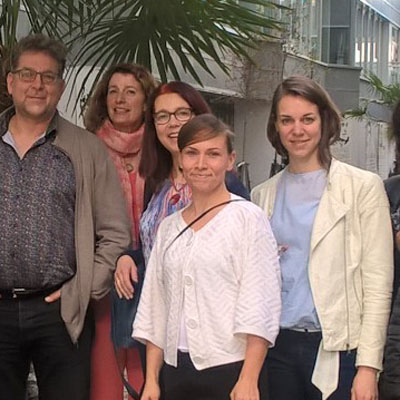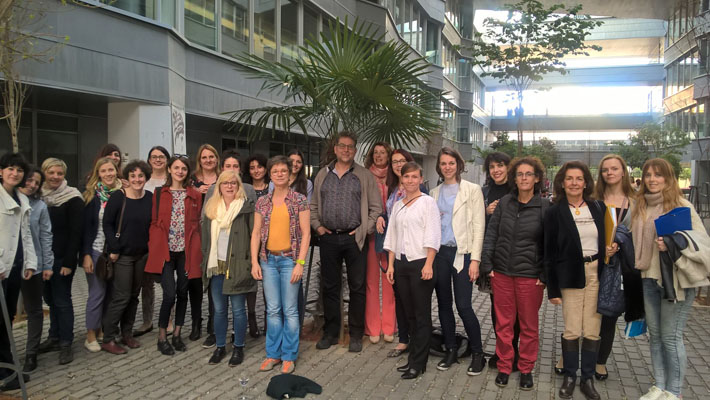Blogs
Seville Training School Reflections: How to Measure Intervention Efficacy?

In the field of Speech and Language Therapy there is a lack of evidence for the efficacy of the intervention methods that are in clinical use. To raise awareness of this issue, COST Action IS1406 organised a Training School, titled “Evidence-Based Practice: Research Methods to Measure Intervention Efficacy.” The Training School was open to applicants from both within and outside of the Action membership, and was kindly hosted by the Department of Education at the University of Seville.
The Event
The Training School, which took place in March 2017, gathered professionals from 14 countries to learn about and discuss issues surrounding Evidence-Based Practice. Participants were from a variety of professions, career stages and cultural backgrounds. Our shared goal was – and is – enhancing children’s oral language skills across Europe and beyond. The primary focus of this event was different research designs.
There were three Trainers leading the workshops: Professor Elin Thordardottir, Professor Maria Kambanaros (both part of the Action Core Group) and Head Librarian Juan Antonio Barrera, from the Department of Education at the host university. Elin guided us through the methodological issues concerning measuring intervention efficacy; whilst Maria focused on taking client values into consideration, and led sessions on what children and parents think of speech and language therapy, according to published research. Juan introduced reference managers and informed us about effective search strategies for research.
The Importance of Evidence-Based Practice
Throughout, the trainers highlighted the importance of founding our work on research evidence along with clinical expertise and client values. Evidence-Based Practice is crucial when we reason to others why our work is important, why our society should fund speech and language services, and why this service should be provided only by appropriately qualified professionals.
Key Challenges to Overcome
There are several challenges hindering speech and language therapists from founding their clinical decision-making on research. The biggest challenges are probably time and resources – clinical caseloads are often high and access to scientific articles limited (often due to publisher paywalls). Ideal best-practice, recommended by Professor Thordardottir, would be to strive to reserve at least one day per month for the search of research evidence. And, although this is admittedly a difficult goal to reach, we should campaign to provide all speech and language therapists with access to scientific databases and encourage the publication of Open Access research papers. Evidence-based practice is, after all, for everyone’s benefit!
Detail: Single-Case Experimental Design
One of the most applicable research designs in evaluating the efficacy of intervention amongst the population with speech, language and communication needs is the single-case experimental design (see for example Howard, Best and Nickels, 2015). In this design, the number of participants is relatively small, although there are many measurement points to detect individual learning effects across time.
Change is measured with “probes”, that is, tasks in which similar skills are needed as the ones that are targeted in the intervention. The probes remain the same throughout the baseline, intervention period, and the maintenance assessment.
In this design, baseline is established by assessing the targeted behaviour in at least three different time points, or until a stable line is established. Only then can the intervention begin. The purpose of the baseline is to act as the no-treatment control condition and eliminate maturation and random variation as explanations for detected change.
The change in skills needs to occur simultaneously with the intervention to establish intervention efficacy.
It is advised to evaluate the targeted skills after a couple of months to see if the skills learned during the intervention are maintained.
The single-case experimental design is relatively feasible to use in a clinical setting to measure the effect of the work that Speech and Language Therapists do on a daily basis. It would be great to see it used more often in clinical practice. At this moment, plenty of valuable information about intervention efficacy is not known as it is neither recorded nor reported to a larger audience.
Moving Forward within COST Action IS1406
Several participants of the Training School were planning on carrying out single-case experimental design studies. There are also plans for large scale research using this design: one of the goals of the Training School was to plan joint research across countries involved in this COST Action. This would be unique research in the sense that it would be carried out in several countries simultaneously, with a similar design. These plans will be developed further and hopefully presented at the next COST Action IS1406 Management Committee Meeting in Limerick (May 2017).
To close, I would like to say that the week of this Training School was informative and inspiring, and I would like to take this opportunity to thank the lecturers and hosts, and to the COST Association for supporting this event!
References
Written by Sirpa Tarvainen, Finland (Working Group Member)

Image: The Seville Training School 2017 Attendees
Last modified: Wed, 22 Mar 2017 15:16:13 GMT



